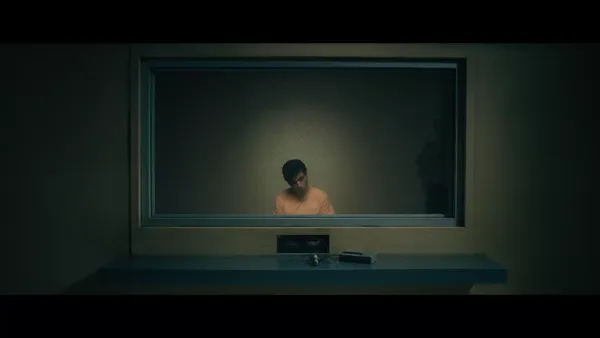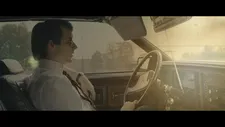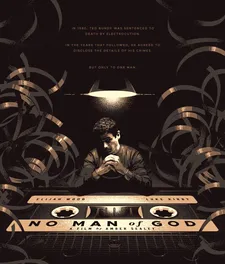 |
| No Man Of God Photo: courtesy of Frightfest |
If there’s one thing that the world isn’t short of, it’s films about Ted Bundy. This one, however, is different. Everywhere that I have spent time with other critics of late, people have been talking about it excitedly: No Man Of God, one of the standout films of the year in any genre. Getting the UK première is quite a coup for Frightfest.
Despite the abundance of films and TV programmes out there, there’s still very little from a female perspective, and male directors persistently seem focused on the idea that there is a great mystery behind the infamous serial killer’s actions. This film, by contrast, seems less interested in him than in the obsession that other people have with him, and that’s what I put to director Amber Sealey when we met a few days before Frightfest.
“Yeah, that's exactly right,” she says. “I mean, I don't see any big mystery to him at all. I see him as a complete narcissist, and deeply insecure and certainly a psychopath as well. To me, we know everything we need to know about him already. I don't understand the mystery about him. I was much more interested in why we are interested in him, rather than being interested in him, if that makes sense.”
It absolutely does, I assure her. I tell her that I love the opening scenes, in which we watch Elijah Wood driving around, watching a woman on his way to work. It’s unfortunate that everybody knows who’s playing who before they go to see a film these days, because otherwise we might wonder if he’s Bundy, but the parallel is nonetheless effective.
“Yeah, that wasn't in the script, I added that. So everything with all the women, the stuff that I added in – I mean, it was a the brilliant script, I loved it and I’m a big fan of the writer, but I was like, ‘We have to add another layer to this, we have to add another perspective.’ What I was interested in was my perspective that I had kind of outsider to the Bundy genre, the serial killer genre. I mean, I've seen a few of those films, but I'm not a particular super fan of that genre.
 |
| Bill's drive to work Photo: courtesy of Frightfest |
“For me as an audience member, what was interesting was just like – well, what about the victims? And what about the women in the room, you know? It's a different thing for a woman to sit there, you know, a woman who knows what it's like to walk down a dark alley and hear footsteps behind her and get scared. Every woman I know, knows that feeling much more deeply than the men that I know. And so I thought, you know, when you've grown up with that kind of experience of having to be afraid for your body and your person, and being told to always be aware of your surroundings and hold your keys with the key pointing out, all this stuff that we're taught as we grow up to keep ourselves safe – I just thought, what are those people thinking about? Our fascination with Bundy. What's their thought about it?
“So Bill [Hagmaier, Elijah Wood’s character] is doing his job, right? He's listening to the tape and doing this job. And an unsuspecting woman drives by and kind of has to hear all that. And her thought is, of course, ‘What the hell is going on?’ And so yeah, I think that is a larger question throughout the movie: could any man do this? Could even a good man do this kind of thing? I mean, what is it that makes some men do things like that, and some not? Is it just a choice? Is it psychopathy? You know, what is it? There's so many factors, I'm sure, and I don't have those answers. But I really like asking the questions. And so to me, it was really important to have that female layer that read, what are the women in the room thinking?”
I ask how she went about casting Bundy, given that a lot of actors would love to take on that role and her choice, Luke Kirby, is not a big star, but it's an interesting performance.
“Yeah, well, I have been a fan of Luke for years. He was in a Canadian show called Slings And Arrows and then this movie Take This Waltz, a Sarah Polley movie. And I was just a fan of his. Most of my ideas just sort of pop into my head, and that was one. It just came into my head and I thought, oh, Kirby would be great. And then I started looking at photos of him and thought ‘Wow, he has some physical similarities,’ and it all clicked for me.
“And so I had offered him the role through the normal channels, you know, through his reps, and he turned it down. And then we we were auditioning and there were tons of wonderful actors interested in the role and they were all great – so many really brilliant actors who I met with and talked with – but I couldn't get Luke out of my head. And I was like, ‘It has to be Luke. I can't think about anyone else for this role.’ And we have friends in common so I hunted him down and I said ‘Look, just meet with me, let's just talk.’ I said ‘I completely respect why you wouldn't want to play this part. It makes sense. And you know, I had the same reservations as you're having about directing it. So let's talk.’
“He was in LA doing some work and so we met at a park. It was actually the very beginning of the pandemic. And so we stayed six feet apart and wore masks. We had a lot in common about how we saw movies like this, how important it was for us to portray the real him, the narcissist, and not, you know – there was nothing about him that was mystical or magical or rock starry, you know. He was a person who wanted people to see that kind of thing in him, but we don't see that kind of thing. And so yeah, we just got on and then he agreed. So I was very, very happy.” She laughs.
“I had to strong arm him a little bit, but he's always a guy who's very thoughtful. And, you know, I really deeply appreciate his reservations about taking this role, because those reservations were ‘Does the world need more Bundy?’ And I understood that. And my point was, that's not a question that I can answer. I do know we are interested in Bundy. And I do know that if we are going to make another Bundy film, that I have something to say about it. You know, I wanted him to be a part of that. And luckily, he agreed.”
I tell her that it seemed to me that she was getting past some of the bullshit Bundy fed to the media to things that he actually said off guard, rather than things he wanted people to think.
 |
| In the interrogation room Photo: courtesy of Frightfest |
“You know, those conversations that happen in the interrogation room? A lot of it is like verbatim stuff they actually said. The real Bill Hagmaier gave us those recordings. When you listen to them – and the writer based his writing off of those conversations, you know, there's certain things of course that we added and dramatised and threw in, but the heart of what they're saying is real. It’s the relationship that they went through. So I think the truth of his insecurity and his desire to seem smart, that's just there in who he was, you know?”
So how did she approach those scenes in the interrogation room? With only two actors in a very small space, did she just trust them to get on with it? Or did she prepare them in particular way for that?
“We did it over Zoom, because it was pandemic time,” she explains. “So we rehearsed over Zoom, and we broke down all the scenes, and we went through it all. I have a theatre background, so I'm used to doing things in that way. There was a huge element that I loved, of performing for each other, you know? They both wanted something there and were pretending that they didn't. Bill wanted Bundy to come clean and tell him everything, all his desires, and why he did it and how he did it and all of that. And Bill had to kind of pretend like he didn't really care about any of the facts or any confessions. And then Bundy wanted Bill to help him stay his execution. He thought ‘If I can get this guy to think I'm really smart and I can help with cases, I become important to the FBI, and I can get them to extend my life.’
“I love that. I love that they wanted something from each other. But you're very right. You know, it was daunting when I first thought ‘Oh, my gosh, 60% to 70% of this movie takes place inside the room, and it's got no windows, nothing. Everyone knows what an interrogation room looks like. It was important to me to keep that really realistic. And I just remembered that I love the human face. I love looking at people, anybody. The face to me is eminently interesting. And not only that, you know, we had Elijah and Luke, who are both so interesting looking.. And so that relaxed me a little bit when I thought, you know, I could watch either of these guys read the phone book and and it would be interesting.
“So that took a little bit of the pressure off, and then we just approached the scenes from a space of ‘Where are they at emotionally?’ And then suddenly everything opened up in terms of camera angles and the framing and the shot listing and the lighting, and all of that, I realised we had a lot of options, and so it just kind of it kind of naturally fell into place.
“When we created the look of the first scenes at the beginning, it's about Bill trying to figure out who Bundy is, so we have the shots through the arm and under the table, and you see half of Bundy’s face and his eyes are pretty shaded, you know, not very well lit. And then as their relationship gets closer and time goes by, the camera lenses changes, you know the way they're sort of merging together images. And then at the end, when we really understand who both of them are, that's when we used very tight close ups, really intimate feeling shots. So, yeah, it I think I just had to trust in the process of filmmaking.”
How did Elijah fit into it all? How did he feel about the whole Bundy myth and so on?
“Elijah is a partner at SpectreVision and they are a genre production company, so they're very interested in horror and thrillers anyway, that's kind of their niche. And I think Elijah personally has an interest in in those kinds of films. And so he already had an interest in the serial killer genre. And they had this script for a number of years before I was attached to it, and were trying to have it made for a few years.
“Originally he was just going to be a producer on it. And then he was attached as an actor, before I came on. But I was thrilled about that, because I love Elijah, and I had always wanted to work with him. He originally was just going to produce and then he got interested in Bill's journey and he thought, actually, there's something really interesting there to me.”
 |
| No Man Of God poster Photo: courtesy of Frightfest |
We don't see anything of the actual killings in the film, I note, and they’re probably a lot of what attracts a certain kind of person to movies about Bundy, perhaps the same way that Bundy was attracted to Detective Comics. It's interesting to approach the story without that and to get at that interior darkness instead.
“It was really important to me that we didn't have any recreation of the crimes,” she says. “That's been done. I don't need to see another woman raped and killed on screen, you know? I just feel like I've seen it so much. It wasn't important to the story that we were telling here, which may seem odd to some, but I felt like that wasn't a visual we needed. We all know what those photos look like, we all have seen it, we all can imagine it. And I felt like it was much more important to see, like you said, the story.
“The story was to me, what is their connection? What are their similarities? What is our obligation here as an audience? You know, who are these men? How do they do what they do? How does Bill sit so close to evil and not become evil himself? What effect does listening to all this evil have on his own psyche? You know, those those things are much more interesting and much more what the film is about. And so yeah, I just I didn't see any need, for the story itself and then also just as a director. I was much more interested in their interior life and their relationships and how their friendship builds and how they play with each other. And most importantly, the effect that listening to everything that Bundy tells him has on Bill.”
We talk about the way she uses space in the film, from early scenes in the interrogation room when Bill seems quite vulnerable and Bundy is deliberately intimidating, to one of the last scenes when the space opens out and Bundy suddenly seems small and weak.
“Underdog is not quite word,” says Amber, “but you know, Bill was right at the very beginning of his profiling career. It was the start of his career, he was kind of young and innocent. And I don't want to say naïve, because he was always very aware of his surroundings, but there was a kind of purity to him, you know? And having this be his first big profiling thing, it certainly had an impact on the rest of his career.
“There were other serial killers, years later, who specifically asked for Bill because they knew of his work with Bundy, and he was so famous. And so this case had a huge impact on his entire career and life. And certainly, it helped him grow in terms of confidence and strength and awareness of like, how good he was at his job.
“I mean, I think that that was part of the game. They were playing for each other as well. You know, Bill was kind of pretending to be powerless. He was in many ways, because he was new to the job, and he didn't really know how to approach Bundy. But he also was acting that part a little bit. He knew that Bundy wanted to feel like the big guy in the room. And so he was letting Bundy feel that. One interesting thing that Bill has told me is that is that Bundy didn't like to say it when he was talking about the bad things that he did. He never liked to say, ‘Well, I did this.’ He liked to say, ‘Well, one would,’ you know? ‘If a guy were doing that, he would...’ And a couple times in their conversations Bill said that Bundy slipped up and accidentally said ‘I,’ and Bundy would get really flustered and that would clam him up and make him want to end the conversation.
“And so Bill devise a plan that whenever Bundy would accidentally say ‘I,’ Bill would stop and say ‘Oh, gosh, I'm so sorry. Ted, can you go back? I wasn't paying any attention. Hey, can you go back and say that again?’ And that would enable Bundy to save face. And that was really interesting to me. And as you say, Bundy’s power sort of diminishes. I mean, I think all his power was always kind of bravado and insecurity, you know, he definitely thought that his experiences, to put it that way, with these women was more important than those women’s entire existences. And so that's a inflated sense of his own importance.
“ I think he enjoyed the fame, and he enjoyed the fact that so much of the public cared about him and was interested in him, but at the end of the day, when faced with his own death he's as small as they get.”
No Man Of God screens at Frightfest tonight, 29 August. It has just been made available for online viewing in the US and will be released on DVD in the UK on 13 September.





















